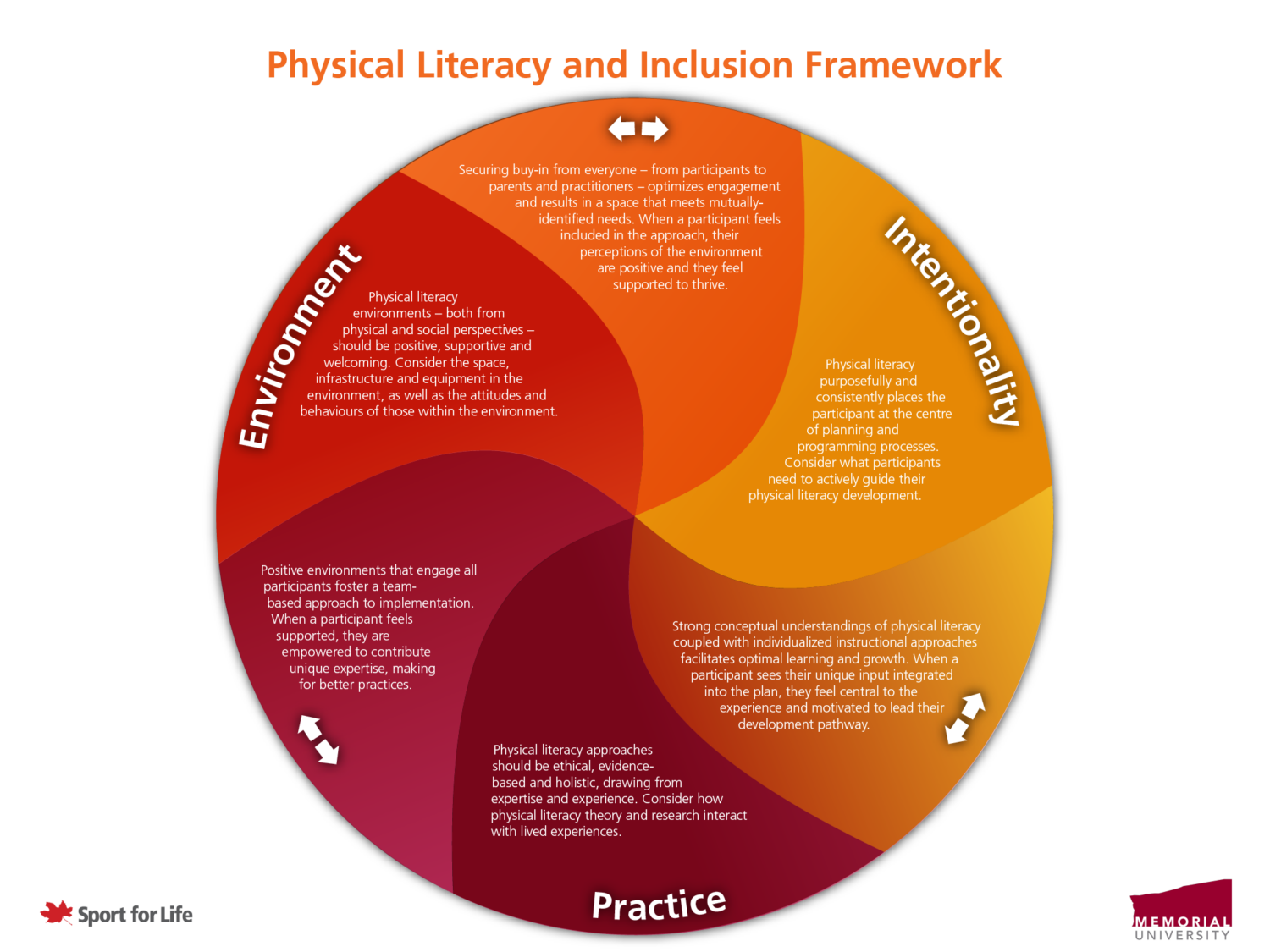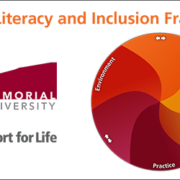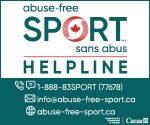Pillars to physical literacy and inclusion: Organizational staff must be committed to the organization, demonstrating passion and intent for establishing meaningful/purposeful physical activity experiences
Many programs have implemented physical literacy (PL) but often overlook the experiences of persons with diverse abilities due to societal, cultural, and political influences. This can lead to exclusion and marginalization from physical activities. Researchers at Memorial University have addressed this challenge by developing a PL and inclusion framework through direct observation of programming and perspectives from participants of diverse abilities, parents, practitioners, and program administrators. The framework and its three pillars of environment, practice and intentionality offer one lens to support the development of current and future inclusive physical literacy programs.

This blog series will discuss the ten evidence-based best practices for the inclusion of persons with diverse abilities in programming suggested within their research findings. From holistic design to systems of support, and everything in between, find out how to foster inclusion in your programs.
Idealization: Organizational staff must be committed to the organization, demonstrating passion and intent for establishing meaningful/purposeful physical activity experiences.
The success of physical activity programs heavily relies on the dedication and passion of the organizational staff. When staff members show genuine commitment, they create an environment that motivates and engages everyone involved, including participants, parents, and practitioners.
In positive and inclusive environments, organizational staff play a crucial role in fostering a team-based approach to program implementation. Participants feel valued and supported and are empowered to contribute their unique expertise, leading to the development of better practices and innovative approaches. This collaborative effort ultimately rewards participant experiences, supporting their physical and personal growth.
Putting into practice
In a local community, a dedicated group of volunteers has created an adaptive sports program aimed at individuals experiencing disabilities. Their commitment to providing meaningful and purposeful physical activity experiences is evident in their approach: The program coordinator, David, understands that passion and commitment are crucial for success. He recruits volunteers with a genuine enthusiasm for making sports accessible to individuals with disabilities. David conducts interviews and orientations for potential volunteers, emphasizing the program’s mission and the significance of creating meaningful experiences. The volunteers selected are knowledgeable about sports and deeply committed to promoting inclusivity.
The volunteer coaches recognize the diverse needs of their participants. They take the time to conduct one-on-one assessments to understand each individual’s abilities, preferences, and goals. Using these assessments, the coaches tailor their training sessions to suit each participant’s specific requirements. They focus on creating a supportive environment where everyone can enjoy sports at their own pace.
David and his team of volunteers are committed to ongoing education. They attend workshops and training sessions on adaptive sports techniques and disability awareness to enhance their skills. David encourages his volunteers to share their newfound knowledge. This commitment to continuous learning ensures that the program remains up-to-date with the latest practices and adaptations.
The program promotes open dialogue between participants, volunteers, and staff. Regular feedback sessions allow participants to express their thoughts and suggest improvements. Based on participant input, the program adapts its activities and strategies. This collaborative approach ensures that the program evolves to meet the changing needs and desires of the participants.
Thanks to the dedication and commitment of David and his team of volunteers, the adaptive sports program encourages physical activity and promotes a sense of community, empowerment, and personal growth among participants experiencing disabilities. Many participants remain engaged in the program for the long term, finding physical benefits, a supportive network, and a meaningful purpose in their participation.
This example demonstrates how a volunteer community-based physical activity practitioner can ensure the principle of organizational staff commitment to establishing meaningful and purposeful physical activity experiences for individuals experiencing disabilities. Through passionate and dedicated volunteers, a person-centred approach, continuous learning, and open communication, the program thrives, positively impacting the lives of its participants.
Tangible takeaways
To encourage organizational staff to be committed to the organization and demonstrate passion and intent for establishing meaningful and purposeful physical literacy experiences, organizations can take the following steps:
- Establish Inclusivity as a Core Value: Make inclusivity a central and non-negotiable value within the organization. Highlight how providing purposeful physical activity experiences for all aligns with this value and reinforces the organization’s commitment to inclusivity.
- Inclusive Training and Professional Development: Provide regular training and professional development opportunities for staff that focus on inclusive practices, diversity, and understanding the needs of diverse populations. This helps staff gain the necessary skills and knowledge to create meaningful and inclusive physical activity experiences for all participants. Learning communities within the organization where staff can share knowledge, experiences, and best practices related to inclusive physical literacy are also a great idea! These communities create a space for continuous learning and inspire staff to innovate and excel in their roles.
- Promote a Sense of Purpose: Clearly communicate the organization’s vision and mission, emphasizing the positive impact of physical activity experiences on individuals’ lives. Remind staff regularly of the purpose and significance of their work, reinforcing their passion for the cause.
- Recognize and Celebrate Success: Acknowledge and celebrate staff achievements and successes in delivering meaningful physical activity experiences. Regular recognition boosts morale and reinforces their dedication to the organization’s mission. Demonstrating the positive outcomes of their work reinforces staff’s commitment and passion for creating meaningful experiences.
- Feedback and Reflection: Encourage regular feedback and reflection sessions where staff can share their experiences and challenges. This allows for continuous improvement and growth, strengthening the organization’s commitment to providing meaningful experiences. Valuing their input creates a sense of ownership and commitment to the organization’s mission and fosters a collaborative environment, and a culture where staff feel empowered to contribute their ideas and perspectives on program design and implementation.
By implementing these strategies, organizations can cultivate a team of dedicated and passionate staff committed to establishing purposeful and inclusive physical activity experiences.
This article is one of a series of posts on the Sport for Life website based on the research conducted by Drs. Kyle Pushkarenko and Jeff Crane of Memorial University. Keep an eye on our blog for information on the ten suggested best practices and ways to take action around them over the coming months.


